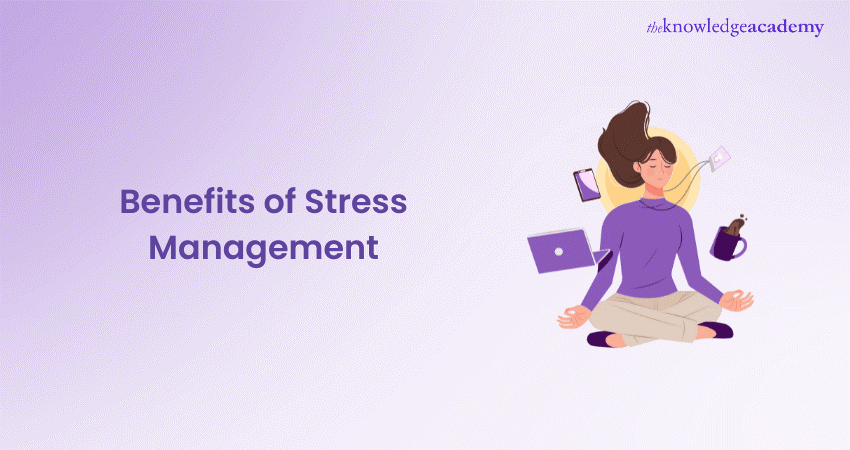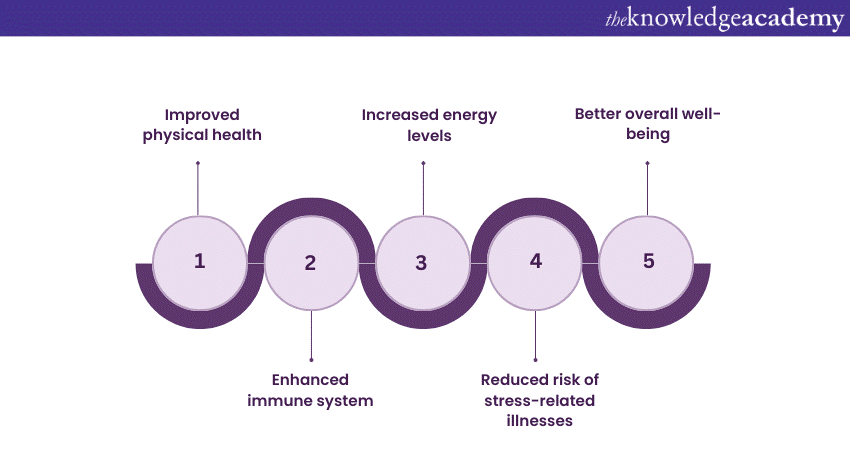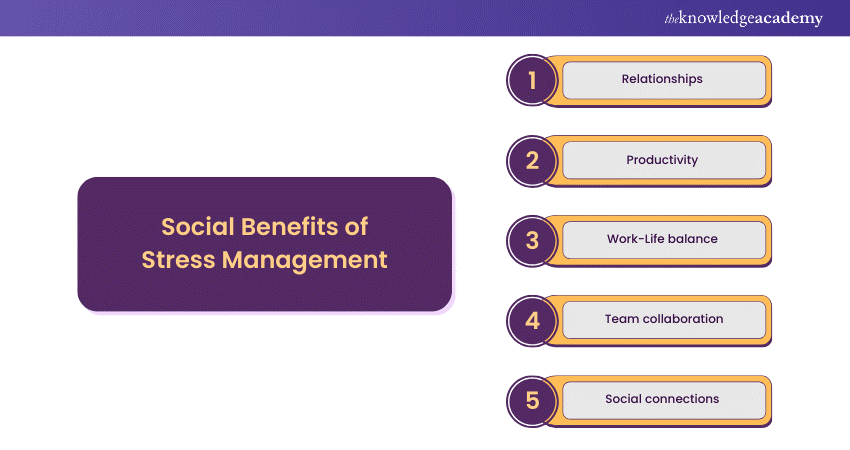We may not have the course you’re looking for. If you enquire or give us a call on +65 6929 8747 and speak to our training experts, we may still be able to help with your training requirements.
Training Outcomes Within Your Budget!
We ensure quality, budget-alignment, and timely delivery by our expert instructors.

Stress has wrapped humanity like a blanket. You speak to anyone, and they could be stressed about something or the other (work, relationships, finance). Little do they know about the incredible Benefits of Stress Management.
According to Statista, out of the people surveyed worldwide, about 26% stated that stress is the most significant health problem facing people in their country. Rather than learning to live with it, it’s time to fight this plague.
But what are the Benefits of Stress Management and how can one fight with it? You need not worry anymore. Read this blog to learn about the key Benefits of Stress Management. Also, explore how to reclaim control over your well-being.
Table of Contents
1) How does stress impact lives?
2) What are ways to cope with stress?
3) Physical Benefits of Stress Management
4) Mental and emotional benefits of managing stress
5) Social Benefits of Stress Management
6) Conclusion
How does stress impact lives?
When left unmanaged or experienced chronically, stress can have a substantial negative impact on various aspects of our lives. Let’s explore some of the key adverse effects of stress:
a) Physical health issues: Increased risk of heart disease, high blood pressure, and gastrointestinal problems. Furthermore, Chronic stress weakens the immune system.
b) Mental health challenges: Includes anxiety disorders and depression. It can also exacerbate existing conditions or trigger the onset of new ones. Persistent stress can lead to feelings of overwhelm, restlessness, irritability, and difficulty concentrating.
c) Emotional imbalance: It leads to mood swings, heightened emotional sensitivity, and a general sense of unhappiness. It can also make managing and regulating emotions challenging, potentially straining relationships with loved ones.
d) Impaired cognitive function: Excessive stress impacts our memory, concentration, and decision-making abilities. It can make it difficult to focus on tasks, solve problems, and think clearly, hindering overall productivity.
e) Sleep disturbances: Stress can also cause difficulties in maintaining a restful sleep or falling asleep throughout the night. Lack of quality sleep further exacerbates stress levels, creating a vicious cycle.
f) Increased risk-taking behaviour: Some individuals resort to unhealthy coping mechanisms in response to stress, like, substance abuse or excessive risk-taking behaviour.
g) Strained relationships: Stress can strain relationships, both personal and professional. Heightened stress levels can result in increased conflicts, reduced communication, and a lack of understanding or empathy towards others.
h) Decreased quality of life: Ultimately, the negative impact of stress can significantly diminish our overall quality of life. It can hinder our ability to enjoy activities, affect our motivation and enthusiasm, and create a constant state of tension and unease.

What are some ways to cope with stress?
Stress is a natural and sometimes unavoidable part of life, but it can have negative effects on your physical and mental health if it becomes chronic or overwhelming. There are many ways to cope with stress, such as:
a) Relaxing your mind and body with techniques like laughter, mindfulness, meditation, massage, and deep breathing.
b) Being physically active and eating a balanced diet that includes more whole foods and less processed foods and added sugar.
c) Improving your sleep habits by avoiding electronics before bed, creating a comfortable environment, and doing something calming like reading or taking a warm bath.
d) Stopping or reducing your use of substances like smoking and alcohol can worsen your stress and harm your health.
e) Keeping a journal to write down your thoughts, feelings, accomplishments, and gratitude.
f) Making time for yourself to do something you enjoy, such as meditating, spending time with a friend, reading a book, or pursuing a hobby.
g) Seeking professional help from a mental health provider if you feel overwhelmed by stress or have symptoms of anxiety or depression. They can teach you techniques to manage stress better, such as Cognitive Behavioural Therapy (CBT).
h) Sharing your feelings with someone you trust, such as a loved one or a friend, who can offer you support and comfort.
i) Taking control of your time and tasks by organising, prioritising, delegating, postponing, or saying no to requests that add to your stress.
j) Adopting a positive outlook and attitude by focusing on the things you can control, challenging negative thoughts, and finding humour in difficult situations.
Learn how to focus on important tasks and achieve goals with our Time Management Training.
Physical Benefits of Stress Management
Effectively managing stress not only promotes our mental and emotional well-being but also offers a multitude of physical benefits. So, let’s find out some of the key physical Benefits of Stress Management:

a) Improved physical health: Effective Stress Management techniques contribute to better cardiovascular health, lowered blood pressure, and improved sleep quality.
b) Enhanced immune system: Managing stress boosts the functionality of the immune system, leading to a stronger defence against illnesses and faster recovery.
c) Increased energy levels: Engaging in Stress Management activities revitalises energy levels, resulting in increased productivity, focus, and motivation.
d) Reduced risk of stress-related illnesses: By taking care of our bodies through Stress Management, we can eliminate the risk of developing health problems related to stress, like heart disease and obesity.
e) Better overall well-being: Stress Management promotes a healthier lifestyle, contributing to a sense of well-being and improved physical functioning.
Mental and emotional benefits of managing Stress
In today's fast-paced and demanding world, it is becoming increasingly important to adopt effective strategies that help us cope with stress and promote a balanced state of mind.
Managing stress not only has a profound impact on our physical well-being but also plays a crucial role in nurturing our mental and emotional health. So, let’s understand the mental and emotional Benefits of Stress Management:
a) Reduced anxiety and stress: Effective Stress Management techniques help reduce anxiety and alleviate stress, promoting a sense of calmness and relaxation.
b) Improved cognitive function: Managing stress enhances cognitive function, leading to improved memory, concentration, and decision-making abilities.
c) Enhanced emotional well-being: Stress Management empowers individuals to regulate their emotions effectively, resulting in better emotional stability and overall well-being.
d) Increased resilience: By practising Stress Management, individuals develop resilience to cope with challenges and bounce back from adversity.
e) Positive outlook: Managing stress cultivates a more positive outlook on life, fostering optimism and a greater sense of happiness.
Get started on your personal development journey today! Register for our Personal Development Courses now!
Social Benefits of Stress Management
When it comes to Stress Management, the benefits extend beyond our individual well-being and permeate into our social lives and relationships.
By effectively managing stress, we can experience a multitude of social benefits that contribute to healthier connections. The social Benefits of Stress Management can be listed as follows:

a) Relationships: Stress Management helps you build stronger and more meaningful relationships by enhancing your communication, empathy, and resilience skills.
b) Productivity: Stress Management boosts your productivity by improving your focus, concentration, and efficiency in your work and personal goals.
c) Work-life balance: Stress Management allows you to achieve a better work-life balance by setting boundaries, prioritising self-care, and maintaining a healthy lifestyle.
d) Team collaboration: Stress Management improves your team collaboration by creating a positive and supportive team environment, where you can cooperate and collaborate with others.
e) Social connection: Stress Management enriches your social connections by increasing your social engagement and participation, expanding your social network, and fostering a sense of belonging.
Learn how to deliver your message for a difficult conversation with our Managing Difficult Conversations Training.
Conclusion
As we navigate the complexities of modern life, let us prioritise self-care and embrace Stress Management as an ongoing practice. There is an abundant number of Benefits of Stress Management. So, transform your life by managing stress effectively and live a happier, healthier and more fulfilling life.
Ready to take control of your stress and improve your well-being? Register for our Stress Management Courses now!
Frequently Asked Questions

Stress Management can help you perform better at work by improving your focus, concentration, and efficiency. It can also prevent burnout, which can affect your motivation, productivity, and satisfaction. By managing stress, you can achieve a healthier work-life balance and thrive in your professional life.

Stress Management can help you balance your work and personal life by setting boundaries, prioritising self-care, and reducing overwhelm. It can also improve your well-being, relationships, and happiness by lowering your stress levels and enhancing your mood. By managing stress, you can cope with daily challenges and enjoy your life more.

The Knowledge Academy takes global learning to new heights, offering over 30,000 online courses across 490+ locations in 220 countries. This expansive reach ensures accessibility and convenience for learners worldwide.
Alongside our diverse Online Course Catalogue, encompassing 17 major categories, we go the extra mile by providing a plethora of free educational Online Resources like News updates, Blogs, videos, webinars, and interview questions. Tailoring learning experiences further, professionals can maximise value with customisable Course Bundles of TKA.

The Knowledge Academy’s Knowledge Pass, a prepaid voucher, adds another layer of flexibility, allowing course bookings over a 12-month period. Join us on a journey where education knows no bounds.

The Knowledge Academy offers various Personal Development courses, including Stress Management, Time Management and Attention Management Training. These courses cater to different skill levels, providing comprehensive insights into Stress Management.
Our Business Skills blogs covers a range of topics related to Stress Management, offering valuable resources, best practices, and industry insights. Whether you are a beginner or looking to advance your Business skills, The Knowledge Academy's diverse courses and informative blogs have you covered.







 Top Rated Course
Top Rated Course



 If you wish to make any changes to your course, please
If you wish to make any changes to your course, please


